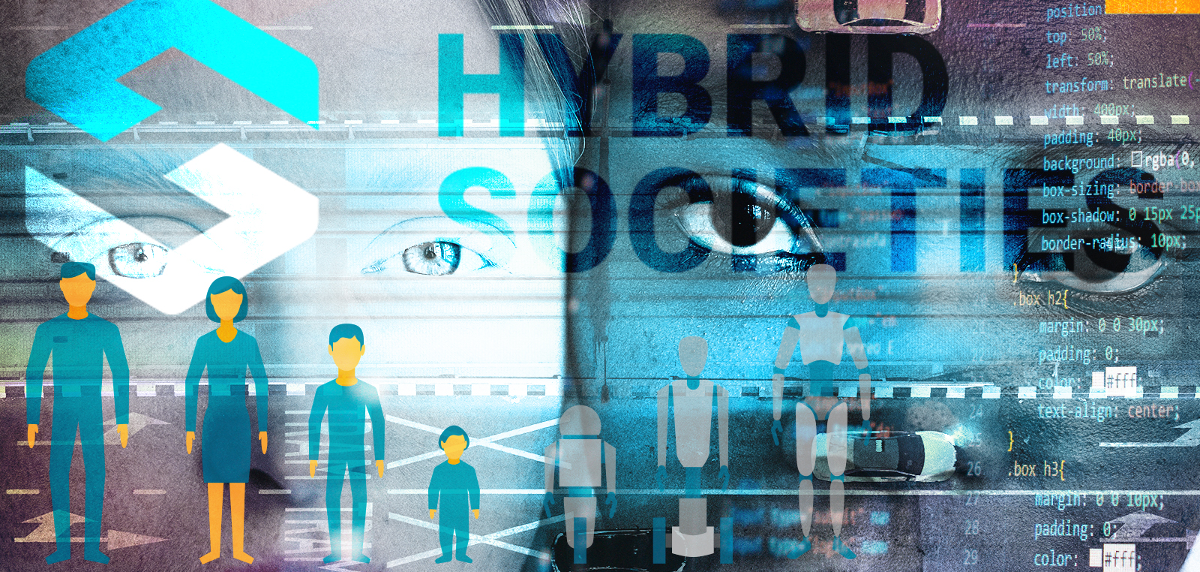The science communication project of the Collaborative Research Centre ‘Hybrid Societies’ brought research to the public. Publications, podcasts, social media content, workshops and an exhibition were realised during the funding period. An ‘urban laboratory’ provided space for dialogue with citizens, supplemented by a lecture series and artistic collaborations. The aim was to make research results accessible to a broad audience, political actors and industry, to promote dialogue and to enable participation in the development of social robots.
Shaping the interaction between people and machines
The Hybrid Societies research association was investigating how people and intelligent technologies can interact with one another. At its core, it was about determining what is necessary so that people and machines can coordinate their activities and movements with one another. What is required so that people can coordinate with robots, highly automated vehicles or virtual figures, for example, as smoothly as they do with other people? And how does technology have to be designed so that it meets these requirements? Fundamental scientific research into these questions is important, as we increasingly share our everyday lives in hybrid societies with machines that think and act independently. To the website
The public relations work (sub-project Ö) of the Collaborative Research Center aimed at core elements of the changing society, which the SFB 'Hybrid Societies' wanted to research and shape. For this purpose, communicative interfaces were provided for mutual exchange with three central target groups: civil society, political actors and decision-makers in industry.
With its three complementary goals (knowing, understanding, accepting), the project went beyond the usual framework of science communication: It created a circular exchange process between scientific progress in the research network and its diverse public and social environment.
Autonomous driving, robots in factories, in your own home, drones, intelligent prostheses - all examples of embodied digital technologies. These can do more and more things. We encounter them in more and more places and in different shapes. And they interact with people and thus form hybrid societies with them.
The coordination with our fellow human beings works relatively smoothly. So that the interactions in hybrid societies are effective and run smoothly, human skills and what is technologically feasible must be analyzed and coordinated in a new way. Research into hybrid societies therefore helps to align the use of embodied digital technologies in public spaces with human needs and skills and to advance the necessary technological innovations.
The Public Relations (Ö) project followed a three-dimensional approach: Knowing, understanding and accepting embodied technologies.
Module 1: Knowing - We wanted to inform about embodied technologies and thus spread and increase knowledge about them and the research involved with them.
Module 2: Understanding - We wanted to know how embodied technologies are understood and enable society to gain a deeper and more critical understanding of embodied technologies.
Module 3: Accept - It was about getting to know existing ideas, fears and expectations about embodied technologies. With this in mind, we wanted to make technology accessible in order to show ways to become familiar with it.
The practical implementation of these three modules led to three tactical elements:
- Publicity
- Mediation
- Experience
These led to eight work packages:
I to III:
- Development of a website, short, reg. updated flyers and more exten. information brochures
- Establishing a regular science newsletter and podcast series
- Running a science blog with news from the entire SFB, Twitter and Instagram accounts
IV to VI:
- Organization of a public lecture series and organization of "town hall meetings"
- annual symposia for actors from industry and politics
- Participation in an international exhibition / conference
- Organization of lab sessions on site in terms of "research you can touch"
VII and VIII:
- Organization of an exhibition (in cooperation)
- Operation of a living lab in the city center as a place to experience and try out
The sub-project Ö did not see itself solely as a driver of the communication of the research activities resident in the SFB, it also saw itself as a research project that pursues the perspective of an international media discourse analysis and made it available for the group.
In order to handle the as yet unsolved challenges and to shape the coexistence of man and machine in public space, it was necessary that a large number of disciplines, from psychology and engineering to mathematics and computer science to the social and human sciences, join forces. A total of 15 sub-projects, two cross-sectional projects and three projects that deal with the coordination of the graduate school, data management and public relations work were involved in the collaborative research center.
The location of the Collaborative Research Center Hybrid Societies was the Technical University of Chemnitz, the sub-project Ö was a project of the Institute for Communication and Media Studies (IfKMW) at the University of Leipzig.
The project was funded by the German Research Foundation (DFG)

